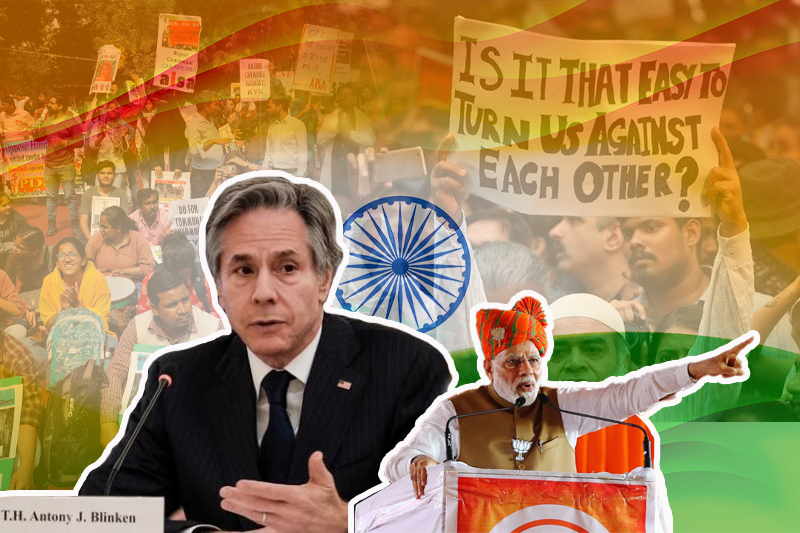
us report highlights significant human rights violations in india in 2022
by Afia Atiq Malik 17 April 2023
The annual report on human rights practices released by the United States Department of State is a comprehensive document that provides an overview of the human rights situation in countries around the world. The latest report, released on March 20, 2023, has highlighted significant human rights issues in India in 2022.
The U.S. Department of State’s report highlights the issue of arbitrary and unlawful killings in India, which includes both the security forces and non-state actors. The report notes that extrajudicial killings, custodial deaths, and encounters with security forces are a common occurrence in India. The report cites several instances of alleged extrajudicial killings by security forces in India, including those in IIOJK, Chhattisgarh, and Manipur.
The report also points out that non-state actors, such as militants and communal groups, are responsible for targeted killings of individuals based on their religion, caste, or political affiliations. The report highlights the lynching of Muslims in the name of cow protection, which has been on the rise in recent years. These killings are carried out with impunity, as the perpetrators often go unpunished.
Furthermore, Indian government has failed to investigate and hold accountable those responsible for human rights abuses, leading to a lack of accountability for these abuses. US department urged the Indian government, in its report, to take immediate steps to investigate and prosecute those responsible for extrajudicial killings, custodial deaths, and other unlawful killings.
It also highlights that the Indian government has an obligation under international human rights law to protect the right to life and ensure that security forces operate in accordance with international human rights standards. The report calls for the Indian government to establish independent and impartial investigations into all allegations of unlawful killings and hold those responsible accountable.
The report further highlighted instances of discrimination based on religious affiliation, caste, tribe, gender identity or expression, disability, and HIV status. Forced labor and child labor are also ongoing issues in India.
The release of this report is intended to inform U.S. policy-making and to encourage governments and societies to respect human rights and fundamental freedoms for all. The report’s findings suggest that India needs to take immediate steps to address the human rights issues identified in the report, including ensuring accountability for human rights abuses, ending discrimination, and providing greater protections for freedom of expression and the press.
One of the most concerning issues highlighted in the report is the arbitrary and unlawful killings by security forces and non-state actors. The Indian government must take immediate steps to investigate and prosecute those responsible for such killings and ensure that security forces adhere to international human rights standards.
The restrictions on freedom of expression and the press are also worrying, with journalists facing violence, threats, and unjustified arrests. The Indian government must take steps to ensure that journalists can operate freely and without fear of reprisals. This includes repealing laws that criminalize speech, removing censorship, and ending site blocking.
India’s civil society and independent judiciary are supposed to be essential components of a functioning democracy. However, their effectiveness is severely hindered by the challenges they face from state and central government authorities. The Indian government must ensure that civil society organizations and the judiciary can operate freely without interference.
The report has unmasked the truly vile face of PM Modi’s India. It is high time for the US and the international community to influence India’s behavior on human rights.
International community and US in particular must support the work of independent human rights organizations and activists in India, and provide them with protection and assistance when they face harassment, intimidation, or violence. For example, Human Rights Watch’s World Report 20232 states that “the government continued to harass and intimidate activists, journalists, academics, students, lawyers, and others who criticized government actions or policies” and that “the authorities also used foreign funding regulations to target outspoken groups for their human rights work”.
Diplomatic and economic leverage must be used to pressure India to comply with its international human rights obligations and commitments, and to hold accountable those responsible for human rights violations and abuses. For example, the US State Department’s Country Report on Human Rights Practices for 20211 states that “the United States continued to urge India to respect religious freedom; combat violence against women, children, members of scheduled castes and scheduled tribes, religious minorities, and LGBTI persons; allow foreign NGOs to operate without undue restriction; cooperate with international human rights mechanisms; uphold the rights of detainees; protect the rights of free expression for all; maintain fair trial guarantees; permit peaceful assembly; and end restrictions on movement and communications in Jammu and Kashmir”.
The annual report on human rights practices released by the United States Department of State highlights significant human rights issues in India in 2022. The Indian government must take immediate steps to ensure accountability for human rights abuses, end discrimination, and provide greater protections for freedom of expression and the press.
About the Author
The writer is an Islamabad based independent researcher with a masters in Development Studies and currently pursuing her PHD in International Relations from the University of Wyoming.



0 Comments
LEAVE A COMMENT
Your email address will not be published